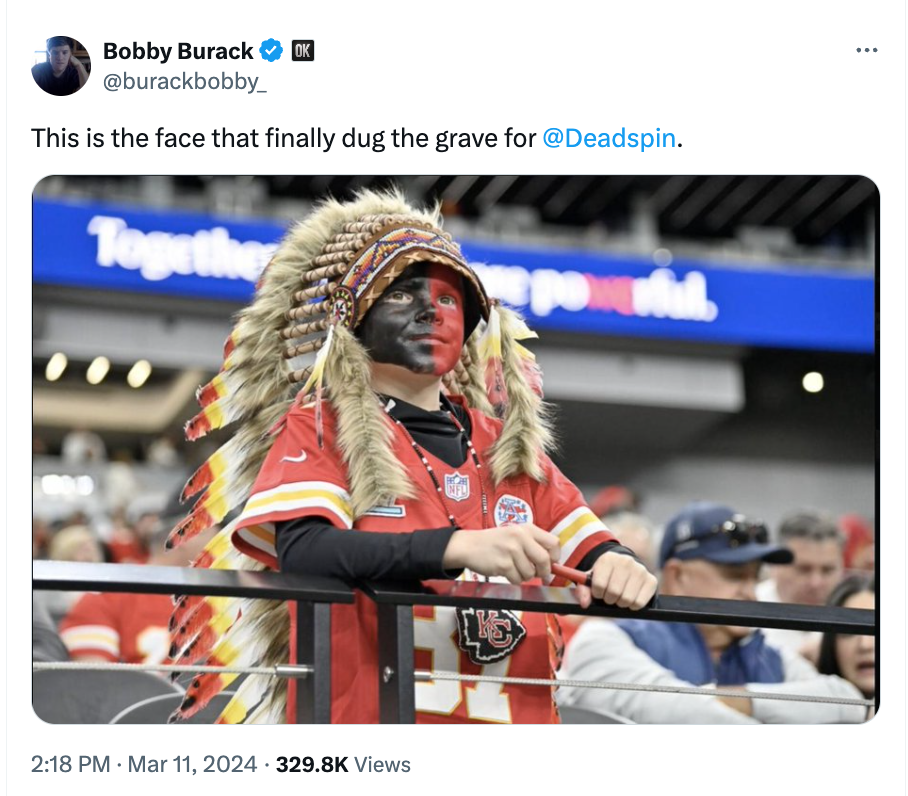News
DEADSPIN IS DEAD: Inside the Scandalous Lawsuit That Forced A Sale

Introduction: In a surprising turn of events, G/O Media has announced the sale of the left-leaning sports platform Deadspin to Lineup Publishing, resulting in the abrupt dismissal of the entire editorial team. This move comes as a consequence of Deadspin’s controversial past, notably its involvement in defaming a young Chiefs fan in 2023, leading to a significant blow to the platform’s credibility.
The Controversial Incident: Deadspin faced widespread criticism when it falsely accused a young Chiefs fan of wearing blackface. The child, in reality, was expressing team spirit by donning the Chiefs’ team colors of red and black. The incident not only tarnished Deadspin’s reputation but also triggered legal consequences. In February, the parents of the young fan initiated a lawsuit against the publication, contributing to the ongoing challenges faced by Deadspin.
Lineup Publishing’s Approach: Lineup Publishing, the new owner, has signaled its intention to take a different approach to Deadspin’s sports coverage while respecting its unique voice. The decision to sell was influenced by several factors, including Lineup Publishing’s editorial strategy, the intense competition in sports journalism, and a valuation that promised a substantial profit from the initial buying price. G/O Media CEO Jim Spanfeller emphasized the need to adapt to the changing landscape of sports journalism.
G/O Media’s Restructuring Efforts: The sale of Deadspin is not an isolated incident but part of G/O Media’s broader strategy to enhance returns for investors. The company underwent significant restructuring in November the previous year, selling other holdings such as Jezebel to Paste Magazine and Lifehacker to Ziff Davis. These moves have resulted in significant job losses, underscoring the challenges faced by digital media companies in a dynamic and competitive environment.
Legal Consequences and Speculations: In the aftermath of the ‘blackface’ controversy, the parents of the young Chiefs fan initiated legal proceedings against Deadspin in February. Some industry observers speculate that this lawsuit played a role in the decision to sell the platform. The legal battle adds another layer of complexity to Deadspin’s woes, demonstrating the potential consequences of irresponsible journalism.
The Decline of Popular News Websites: Deadspin’s fate mirrors a broader trend in the digital media landscape. Several once-popular news websites have ceased operations, with Sports Illustrated laying off its entire staff in January and Vice Media announcing the cessation of publishing on Vice.com, resulting in mass layoffs. These developments highlight the challenges faced by digital media outlets in sustaining their operations amidst fierce competition and evolving consumer preferences.
Conclusion: Deadspin’s sale to Lineup Publishing serves as a cautionary tale against the pitfalls of fake news and the far-reaching consequences it can have on a media outlet’s reputation. As the industry undergoes rapid changes, the need for responsible journalism has never been more critical. Deadspin’s downfall should be a stark reminder for other media organizations to prioritize accuracy, integrity, and ethical reporting to maintain trust and relevance in an ever-evolving media landscape.
